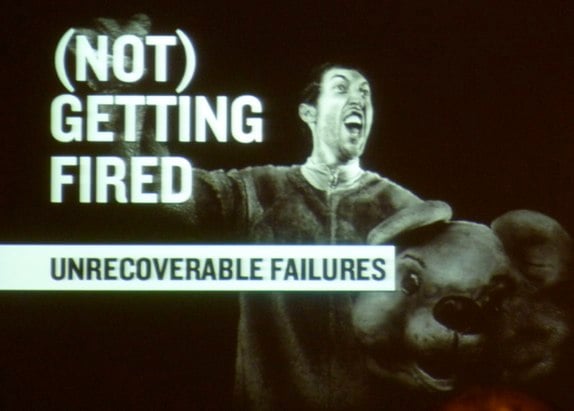Latest Gear Live Videos
Monday March 15, 2010 1:44 pm
SXSW 2010: We F*cked Up: Happy Cog and Friends Exploring Failures Together

This cleverly named, yet light hearted SXSW 2010 panel of Greg Storey, Will Reynolds, Greg Hoy, Tracey Halvosen and was narrated by Kevin Hoffman. Panelists told stories that technology consultants must deal with every day through interactions with their clients. Most of the stories told were a bit sensationalized around a client’s unrealistic
expectations, mostly in regard to time to complete a project or disagreements of which technology to base a project on. It seems that clients always want it faster, and typically more complex that it needs to be - something that is typically mutually exclusive.
Consultants are not perfect, and testing new features or methods on a client may prove to be disastrous when you work outside of your scope of expertise. For example, one consultant on the panel said that they could help a client deliver an email message to their customer, and took on the project of developing the mailing system in house. Rather than send a unique email to each user, or blind copy the customers, every email address in the client database was sent within the “To” field, something that one of my companies has been guilty of, albeit during the early Web 1.0 days. This made all of the other client email addresses viewable from any one of the customers who received the message. For this example, the client re-issued an apology offer, along with a discounted offer and the consultant ultimately paid a professional email marketer to re-send this message using their technology and expertise to avoid the snafu of sharing private email addresses. As an aside, I received some marketing emails from SXSW film presenters who too left email addresses visible in the “To” field. That is unacceptable in 2010.
If you are a technology consultant, it seems that you will do whatever it takes to keep a client, but what if they are draining your resources, upsetting your employees or ultimately costing you more than you are making from them? More than half of the audience raised their hands when the moderator asked “how many of you have wanted to
be fired by a client.” Halvorsen shared a story about a client that they were under contract with, that they wished to break the contract. Rather than be in breach of contract, their lawyer suggested the tactic of raising their rates for the most mundane projects. This ultimately worked, as the client made more and more requests, costs added to these “change fees” were ultimately a contributing factor in causing the client to drop the consultant. This creative way of pushing the client away may work to also halt “feature creep” that the client adds to an initial scope of a project.
But how do you know when you should fire your clients? A good rule of thumb is when they quit being a partner, and when the team has so much pain that it would be easier to drop the client than it would to replace members on the team who may quit because they were being harassed by the client.
Greg Hoy gave his top 5 warning signs on what to look out for when starting a new client relationship:
- Lots of early revising of project contract
- Huge team on the client side
- Vague on project scope and direction
- Unrealistic time expectations, especially for complex sites
- Make sure the boss is engaged and approves the direction
My favorite quote from the session was re-tweeted by consultant Whitney Hess @whitneyhess “We’re not in the drug business, so we tend not to shoot each other dead when we make mistakes” - @brilliantcrank
Dave Mathews @ggdm is an inventor, broadcaster and consultant who has helped such companies as RadioShack, Sling Media and boxee. You can find more of his content at www.davemathews.com.
- Related Tags:
- client relationships, consulting, happy cog, sxsw, sxsw 2010, sxswfailure, sxswi, sxswi 2010
Advertisement
Advertisement
Advertisement
© Gear Live Media, LLC. 2007 – User-posted content, unless source is quoted, is licensed under a Creative Commons Public Domain License. Gear Live graphics, logos, designs, page headers, button icons, videos, articles, blogs, forums, scripts and other service names are the trademarks of Gear Live Inc.












Comments: